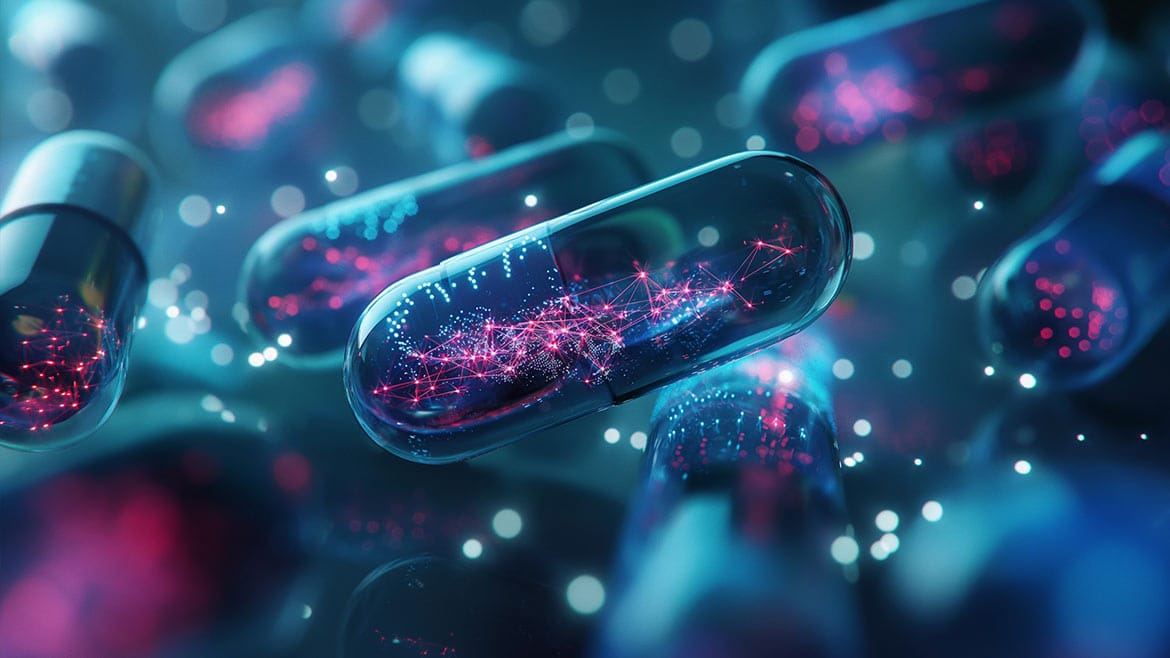Table of Contents
In the old days, getting a new drug to market was like dragging a boulder up a mountain – slow, costly, and full of uncertainty. But now, with AI stepping into the game, the path is transforming, promising to slash expenses and accelerate development like never before. In recent years, artificial intelligence (AI) has been making waves in the pharmaceutical industry, fundamentally changing the way drugs are discovered and developed. Let’s explore how!
The Promise of AI in Drug Discovery
The pharmaceutical industry has long faced challenges in drug discovery, which is both time-consuming and costly. On average, it takes around $2.6 billion and many years to bring a new drug to market. This process involves:
- Extensive screening of molecular libraries
- Numerous rounds of testing
- Clinical trials, with only about 9.6% of drugs successfully making it through Phase I trials to reach the market
AI is poised to revolutionize this process. With its ability to analyze vast datasets quickly and accurately, AI can identify potential drug candidates much faster than traditional methods. Machine learning algorithms can sift through extensive molecular and clinical data, uncovering patterns and insights that human researchers might miss. This capability is transforming the pharmaceutical landscape, making drug discovery more efficient and cost-effective.
Market Potential and Industry Adoption
The market potential for AI-enabled drug development is immense. Estimates suggest that the market could reach nearly $50 billion, with projections indicating that by 2025, 30% of new drugs will be discovered using AI. Despite its early stage of adoption, AI is already showing significant promise in the pharmaceutical industry, although experts have varied opinions on its overall progress and the challenges it faces.
How AI is Transforming Drug Discovery
Accelerating Drug Development
Among the many game-changing perks of AI in drug discovery, its superpower is turbocharging the hunt for promising drug targets. Traditional methods can be slow and labor-intensive, but AI can analyze extensive datasets swiftly, leading to the rapid discovery of potential drug candidates. This acceleration streamlines the lead discovery process, saving valuable time and resources for researchers and pharmaceutical companies.
Enhancing Drug Efficacy and Safety
AI’s vital role extends to predicting the pharmacological characteristics of lead molecules by analyzing their chemical structures. Utilizing machine learning algorithms, researchers can devise models that forecast essential properties such as:
- Solubility
- Bioavailability
- Toxicity
These models guide in setting the design of new molecules with improved pharmacological characteristics, enhancing the efficacy and safety of potential drug candidates.
Improving Clinical Trial Design
AI significantly improves the design and execution of clinical trials. By analyzing electronic medical records and patient data, AI can streamline patient recruitment, identifying suitable candidates more efficiently. Moreover, AI helps optimize trial designs by identifying patient subgroups more likely to respond positively to specific treatments. This personalized approach increases the likelihood of trial success and enhances patient outcomes.
Predicting Drug Bioactivity
AI has revolutionized the prediction of drug bioactivity. Techniques such as quantitative structure-activity relationship (QSAR) modeling and molecular docking analyze the chemical structure of compounds and their interactions with target proteins. Deep learning techniques further enhance these predictions by uncovering intricate patterns within vast datasets, leading to more accurate predictions of a compound’s biological activity.
Ensuring Quality Assurance
Quality assurance is another area where AI is making a significant impact. AI-powered computer vision algorithms can automate the inspection process, identifying defects, contamination, and packaging inconsistencies to ensure drugs meet strict quality standards. Additionally, AI can analyze sensor data from manufacturing equipment, enabling predictive maintenance and reducing production downtime.
Real-World Applications of AI in Drug Discovery
Several notable case studies highlight the successful integration of AI methodologies in drug discovery:
⦁ Cancer Treatment Compounds: AI has been used to discover new cancer treatment compounds by analyzing vast datasets of known cancer-related compounds.
⦁ MEK Protein Inhibitors: Machine learning (ML) has identified effective inhibitors for the MEK protein, a crucial target in cancer therapy.
⦁ Alzheimer’s Disease: ML algorithms have simplified the discovery of new inhibitors for beta-secretase (BACE1), a key protein implicated in Alzheimer’s disease.
⦁ Novel Antibiotics: Advanced ML techniques have identified promising new antibiotics effective against drug-resistant bacterial strains.
⦁ COVID-19 Research: AI has played a crucial role in identifying specific compounds for treating COVID-19, showcasing its ability to respond quickly to emerging health crises.
Challenges and the Future of AI in Drug Discovery
Despite its potential, AI in drug discovery faces several challenges:
⦁ Ensuring patient data privacy and adhering to regulations like HIPAA, DPR, and more.
⦁ AI requires large, high-quality datasets, which can be scarce and varied in quality.
⦁ Implementing AI solutions requires significant financial investments and specialized expertise.
⦁ Complex AI models need to be interpretable and transparent to build trust and confidence.
⦁ The absence of standardized data formats and analysis techniques makes it difficult to compare studies and datasets effectively.
Conclusion
Looking ahead, the integration of AI in drug discovery is expected to grow exponentially. The AI market in pharmaceuticals is projected to surge from $200 million in 2015 to $5 billion by 2024. This growth highlights AI’s transformative potential in reshaping the pharmaceutical industry and advancing healthcare.
In conclusion, AI-driven drug discovery holds immense promise for accelerating medicinal advances. By reducing costs, speeding up development timelines, and improving the efficacy and safety of drugs, AI is set to revolutionize the pharmaceutical industry. As technology continues to evolve, the potential for AI to drive significant improvements in drug discovery and development will only increase, offering new hope for faster, more effective treatments for a wide range of diseases.


